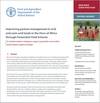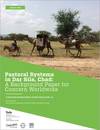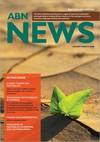Recurrent drought, degraded rangelands and reduced access to traditional grazing lands have left pastoral communities in the Horn of Africa’s arid and semi-arid lands (ASALs) more vulnerable and facing severe livestock feed shortages. During dry spells, pastoral communities suffer from food and nutrition insecurity, as well as shrinking incomes occasioned by livestock losses and reduced livestock production. Climate change adds an extra layer of vulnerability to this already fragile ecosystem, exacerbating the underlying causes of poverty and food insecurity.During the past two decades, FAO and its partners have conducted Pastoralist Field Schools (PFS) in the Horn of Africa’s ASALs to address this challenging context. Specifically, this document describes how their recent experiences with PFS in Kenya and Ethiopia have contributed to restoring the livelihoods of livestock-dependent communities through improved pasture management.
Year of publication: 2018Organization: Organisation des Nations Unies pour l'alimentation et l'agriculture (FAO)
Topic: Changement climatique, Sécurité alimentaire, Résilience
Language: English
Type of document: Technique
Geographical coverage: Afrique orientale
The study contributes to the understanding of the dynamics of pastoralism and farming in Dar Sila in relation to its natural, social, and economic environment. The authors review the history of the development of pastoralism in Chad, look closely at pastoral systems in eastern Chad, review the policy and institutional context for pastoralism in Chad, and offer recommendations for practitioners working with pastoralist communities in Dar Sila and nationally in Chad.
Year of publication: 2018Organization:
Topic: Résilience
Language: English
Type of document: Technique
Geographical coverage: Afrique occidentale
Pastoralism as a concept continues to be misunderstood with pastoralists often on the receiving end of government marginalisation and harassment. This edition of the African Biodiversity Network newsletter addresses the challenges faced by pastoralists in the region and sheds light on the benefits of pastoralism at the community and national level. It highlights the relationship between climate change and pastoralism, and showcases the plight of pastoralists in Tanzania through a case study. It also addresses the broader challenges faced by pastoralists in Eastern and Southern Africa like forceful evictions.
Year of publication: 2018Organization: Auteurs individuels
Topic: Changement climatique, Peuples autochtones, Régime foncier, Résilience
Language: English
Type of document: Bulletins
Geographical coverage: Afrique orientale
Pastoralists-farmers’ conflicts in Nigeria have grown, spread and intensified over the past decade and today pose a threat to national survival. Each day, there are more revenge killings, in retaliation for previous killings, which are making the possibilities of peaceful resolution more difficult. Rural banditry is becoming the norm in the Nigerian hinterland and has been transformed into a vicious criminal activity. The result is that the scale of loss of both herds and human life has been escalating and the victims are on all sides – subsistence farmers, commercial farmers and pastoralists. This memorandum was written in an attempt to get stakeholders to pause, reflect and seek a way out of the pastoralists-farmers’ conflict in Nigeria.
Year of publication: 2018Organization: Auteurs individuels
Topic: Conflit
Language: English
Type of document: Technique
Geographical coverage: Afrique occidentale
Change in climate and climate extremes are acknowledged as a vital challenge to pastoral production systems. Alternative systems that are accessible to a household in order to make a living could determine the household’s resilience at a given point in time. This study was conducted in the Southern Afar region in Ethiopia to understand the resilience of pastoralists to climate change and variability.
Year of publication: 2018Organization: Auteurs individuels
Topic: Changement climatique, Résilience
Language: English
Type of document: Technique
Geographical coverage: Afrique orientale
Pratiqué par des populations vivant sur les parcours et exploitant des troupeaux d’herbivores domestiques, le pastoralisme est une activité agricole de production, une forme d'élevage extensif, qui suppose un rapport étroit entre l'espace pastoral, les hommes qui y vivent et les troupeaux qu'ils exploitent. Quelles que soient les régions du monde le concernant, les animaux conduits sur un mode extensif utilisent les ressources de la végétation naturelle, mais aussi d’autres ressources, fourrages ou aliments concentrés, associées à ce système alimentaire dominant
Year of publication: 2018Organization: Centre international de hautes études agronomiques méditerranéennes (CIHEAM)
Topic: Sécurité alimentaire
Language: Français
Type of document: Technique
Geographical coverage: Global
This guide contains advice for communities who have agreed to negotiate with a potential investor. It describes the various sections and clauses that should be in a contract, advises what protective language to include, and warns of “red flag” language to avoid.
Year of publication: 2018Organization: Auteurs individuels
Topic: Conflit, Peuples autochtones, Régime foncier
Language: English
Type of document: Technique
Geographical coverage: Global
This library contains articles, scientific publications, as well as new and updated documents on silvopastoral systems.
Year of publication: 2018Organization: Organisation des Nations Unies pour l'alimentation et l'agriculture (FAO)
Topic: Changement climatique, Économie, Services environnementaux, Sécurité alimentaire, Innovation, Value addition
Language: English
Type of document: Bases de données
Geographical coverage: Global









